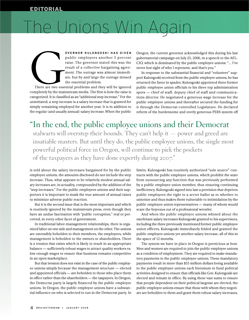The Unions Win Again
Editorial
Governor Kulongoski has given public employees
another 5 percent raise. The governor stated this was the result of a
collective bargaining agreement. The outrage was almost immediate, but
by and large the outrage missed the essential problem.

There are two essential problems and they will be ignored completely
by the mainstream media. The first is how the raise is categorized. It
is classified as an “additional step increase.” For the uninitiated,
a step increase is a salary increase that is granted for simply remaining
employed for another year. It is in addition to the regular (and usually
annual) salary increase. When the public is told about the salary increases
bargained for by the public employee unions, the amounts disclosed do
not include the step increase. Thus, what appears to be relatively modest
annual salary increases are, in actuality, compounded by the addition
of the “step increases.” For the public employees unions and
their supporters it is important to mask the true amount of annual raises
to minimize adverse public reaction.
But it is the second issue that is the most important and which is routinely
ignored by the mainstream press, even though they have an undue fascination
with “public corruption,” real or perceived, in every other
facet of government.
In traditional labor-management relationships, there is organized labor
on one side and management on the other. The unions are ostensibly beholden
to their members, the employees, while management is beholden to the owners
or shareholders. There is a tension that exists which is likely to result
in an appropriate balance — sufficiently robust wages to attract
quality workers vs. low enough wages to ensure that business remains competitive
in an open marketplace.
But that tension does not exist in the case of the public employee unions
simply because the management structure — elected and appointed
officials — are beholden to those who place them in office rather
than the shareholders — the taxpayers. In Oregon, the Democrat party
is largely financed by the public employee unions. In Oregon, the public
employee unions have a substantial influence on who is selected to run
in the Democrat party. In Oregon, the current governor acknowledged during
his last gubernatorial campaign on July 25, 2006, during a speech to the
AFL-CIO, which is dominated by the public employee unions: “ …
I’ve never lost sight of who I represent, and that’s you.”
In response to the substantial financial and “volunteer”
support Kulongoski received from the public employee unions, he has returned
the favor in spades. Kulongoski appointed three former public employee
union officials to his three top administration spots — chief of
staff, deputy chief of staff and communications director. He negotiated
a generous wage increase for the public employee unions and thereafter
secured the funding for it through the Democrat-controlled Legislature.
He declared reform of the burdensome and overly generous PERS system off
limits. Kulongoski has routinely authorized “sole source”
contracts with the public employee unions, which prohibit the state from
outsourcing any function that was previously performed by a public employee
union member, thus ensuring continuing inefficiency. Kulongoski signed
into law a provision that deprives public employees the right to a secret
ballot as to whether to unionize and thus makes them vulnerable to intimidation
by the public employee union representatives — many of whom would
scare the bejeezus out of a professional wrestler.
And when the public employee unions whined about the exorbitant salary
increases Kulongoski granted to his supervisors, including the three previously
mentioned former public employee union officers, Kulongoski immediately
folded and granted the public employee unions yet another salary increase,
all of this in the space of 12 months.
The system we have in place in Oregon is pernicious at best. Men and
women are required to join the public employee unions as a condition of
employment. They are required to make mandatory payments to the public
employee unions. These mandatory payments result in more than $55 million
dollars being available to the public employee unions each biennium to
fund political activities designed to ensure that officials like Gov.
Kulongoski are elected and remain in office. By using these vast sums
to ensure that people dependent on their political largesse are elected,
the public employee unions ensure that those with whom they negotiate
are beholden to them and grant them robust salary increases, handsome
pensions, ease in imposing mandatory membership on new employees, and
unlimited political power. And all of this at the expense of the taxpayers.
This is a system that goes largely unnoticed and unappreciated by the
average Oregonian, in part because average Oregonians are so busy trying
to put food on their table that they cannot pay attention to the nuances
of political power, and in part because Oregon’s mainstream media
refuses to disturb the liberal status quo.
In the end, the public employee unions and their Democrat stalwarts will
overstep their bounds. They can’t help it — power and greed
are insatiable masters. But until they do, the public employee unions,
the single most powerful political force in Oregon, will continue to pick
the pockets of the taxpayers as they have done expertly during 2007.
|